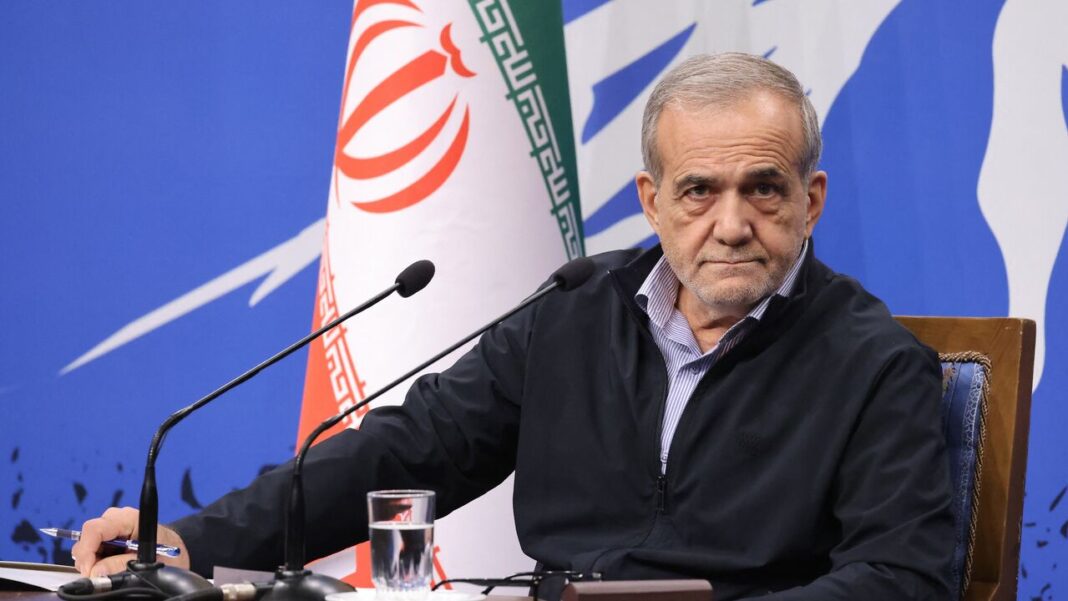Iran’s President Masoud Pezeshkian has had a whirlwind first month and a half in office. His leadership began during one of the most tumultuous times in Iran’s history since the 1979 revolution. He’s navigating a minefield of foreign policy tensions, domestic challenges, and balancing different political factions within his government.
Escalating Tensions with Israel
One of Pezeshkian’s main foreign policy issues has been rising tensions with Israel. In recent weeks, Iran has been involved in discussions about a possible retaliatory strike on Israel. The president has called for international action, accusing Israel of committing “genocide” in Gaza. However, Pezeshkian has also denied allegations that Iran sent hypersonic ballistic missiles to Yemen’s Houthi rebels. These denials followed a report of one of these projectiles landing in central Israel.
One of Pezeshkian’s main foreign policy issues has been rising tensions with Israel. In recent weeks, Iran has been involved in discussions about a possible retaliatory strike on Israel. The president has called for international action, accusing Israel of committing “genocide” in Gaza. However, Pezeshkian has also denied allegations that Iran sent hypersonic ballistic missiles to Yemen’s Houthi rebels. These denials followed a report of one of these projectiles landing in central Israel.
Pezeshkian has made it clear that Iran’s retaliation against Israel will be carefully timed. He aims to avoid escalating tensions to a full-scale war, particularly with hopes of reaching a ceasefire in Gaza. Despite these claims, Iranian support for groups like Hamas, Hezbollah, and the Houthis continues to fuel accusations from Israel that Iran is destabilizing the region.
Pezeshkian’s First International Trip
Last week, Pezeshkian embarked on his first foreign trip, visiting neighboring Iraq. He held meetings in both Baghdad and Erbil, strengthening ties with Iraqi leaders. Later this month, Pezeshkian is set to address the United Nations General Assembly in New York, where his foreign policy will come under global scrutiny.
Domestic Struggles and Political Challenges
Pezeshkian has also encountered major political obstacles at home. His entire list of cabinet ministers was approved by parliament, the first time this has happened since 2001. This was considered a political win, but it came with controversy.
Pezeshkian ran on a platform that promised economic reforms, greater transparency, and better opportunities for marginalized groups. He also pledged to address the contentious issue of mandatory head coverings for women. However, his cabinet choices have raised eyebrows, as many of his ministers were members of previous governments or part of hardline factions.
A Divisive Cabinet
Out of the 19 ministers in Pezeshkian’s cabinet, several have ties to former President Ebrahim Raisi’s government. The appointment of Esmail Khatib as Intelligence Minister was particularly controversial. Khatib was seen as a holdover from the Raisi administration, which was unpopular among reformists. Another contentious figure is Interior Minister Eskandar Momeni, who has a military background and supports strict enforcement of the hijab laws.
Pezeshkian’s cabinet is not diverse in terms of age or marginalized religious groups. Despite his promises of a younger, more representative cabinet, his ministers’ average age is getting near to sixty. The 47-year-old female minister is the second since the revolution of 1979, but there are no ministers from minority groups.
Backlash and Resignations
The backlash from Pezeshkian’s cabinet choices was swift. Many reformists and moderates who supported his campaign expressed disappointment. The most notable resignation came from Mohammad Javad Zarif, the former foreign minister who played a key role in helping Pezeshkian get elected. Although he initially stepped down, Zarif later agreed to stay on as the president’s deputy for strategic affairs after Pezeshkian personally requested it.
In response to the criticism, Pezeshkian urged the public to give his cabinet a chance to prove itself. He acknowledged the controversy but asked for patience, stating that judgment should be reserved until the government’s performance could be evaluated.
Foreign Policy Balancing Act
Pezeshkian’s foreign policy has been a balancing act between maintaining Iran’s support for its regional allies and trying to improve relations with the West. On one hand, he continues to support groups like Hezbollah and Hamas, which are aligned with Iran’s resistance axis. On the other hand, he seeks to improve Iran’s international standing and lift sanctions.
Iran was accused last week by the US and several European nations of supplying ballistic missiles to Russia for use in the crisis in Ukraine. Tehran denies these claims, stating that the deal to provide missiles was made before Pezeshkian took office. Nevertheless, these accusations have led to additional sanctions on Iran, which will likely hinder Pezeshkian’s goal of ending the country’s economic isolation.
Navigating Sanctions and Economic Isolation
One of Pezeshkian’s top priorities is to navigate Iran’s crippling economic sanctions. The sanctions, which have been imposed by the US and its allies, have severely limited Iran’s ability to trade internationally. Pezeshkian hopes to negotiate the removal of these sanctions while passing financial transparency laws to improve Iran’s economy.
Achieving this goal will require delicate diplomacy. Pezeshkian needs to balance his domestic agenda with Iran’s regional ambitions. This includes the challenge of continuing Iran’s support for Palestinian and Lebanese groups, which puts him at odds with Western powers.
What’s Next for Pezeshkian?
Pezeshkian’s first six weeks in office have been anything but quiet. As he prepares for his address at the UN General Assembly, he faces growing tensions at home and abroad. The president’s challenge will be to keep his campaign promises of reform while navigating the complex geopolitical landscape that Iran finds itself in.
Iran’s president must also address pressing domestic concerns. High inflation, unemployment, and public dissatisfaction with government policies remain key issues. Pezeshkian’s ability to manage these challenges will determine the success of his presidency.
Whether Pezeshkian can maintain stability in Iran while avoiding a larger regional conflict remains to be seen. His presidency has started on a turbulent note, and the coming months will be crucial for determining his legacy.

